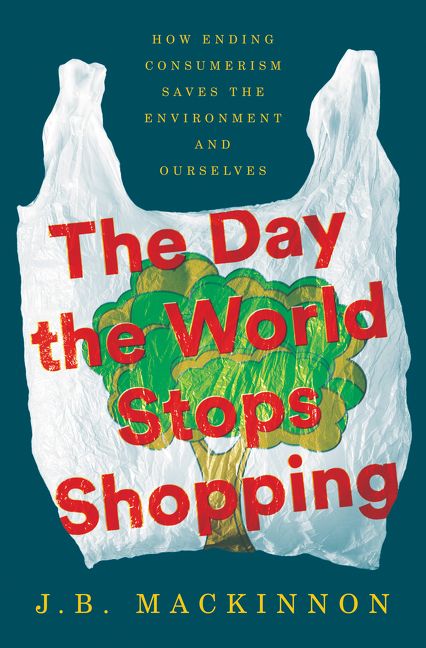 Today, we welcome a guest post from J.B. MacKinnon, author of The Day the World Stops Shopping—a thoughtful and surprisingly optimistic book that investigates how we may achieve a world without shopping.
Today, we welcome a guest post from J.B. MacKinnon, author of The Day the World Stops Shopping—a thoughtful and surprisingly optimistic book that investigates how we may achieve a world without shopping.
Check out some of the praise for the book:
—Kirkus Reviews, ⭐ review
—Library Journal
—Publishers Weekly
“Libraries have always been models for a lower-consuming society.” So goes a line from my new book, The Day the World Stops Shopping, which roams the world in an attempt to answer a surprisingly difficult question: What would the world look like if we consumed a little less stuff? One answer is, there would probably be a lot more libraries.
This book began when, after writing for years about nature and the environment, I came face to face with what I think of as the “consumer dilemma”: We must stop shopping, but we can’t stop shopping. On the one hand, consumerism is now the world’s greatest driver of climate change and other eco-crises—even more so than the world’s rising population. On the other hand, whenever consumers slow their spending, it throws the economy into a tailspin. What’s the solution?
So began a search for people and places that could show me what life after shopping could be. To find out who we might become in a post-consumer world, I spoke to psychologists who study what happens when we give up materialism, spent time with hunter-gatherers in Namibia who live with minimal possessions, and explored a London borough that is trying to turn its residents from consumers into “participants.” To learn how business might change, I visited centuries-old companies in Japan that don’t worry whether they grow or not, and new start-ups that are trying to get back to making things that last. I kept chasing down these paths until I began to see a way past the consumer dilemma.
Then something extraordinary happened: The world really did stop shopping. The COVID-19 pandemic emerged, and the global economy locked down. It was a chance, however grim, to see whether my predictions of how a world without shopping might change were on target or off by a mile.
They were on target—only more so. We witnessed shifts away from materialist values at speeds that shocked even the experts. Emissions dropped, skies cleared, and wildlife retook the quieted landscape. Digital and virtual consumption replaced the real thing, brands began to drift toward buy-less-buy-better business models, and people began to rethink everything from time to work to keeping up with the Joneses.
A pandemic world isn’t what we want, of course. It’s not only a world without shopping, but also one without the human relationships we need so badly. Right now, I think we’re all looking forward to a little more consumer culture than we’ve seen in a while. We won’t stop there, though. Already there are clear signs that we’ll roar out of the pandemic with a record-setting consumption binge that pushes aside the new priorities many of us have set for ourselves, and pushes the planet back to the breaking point.
As that happens, a lot of us will question what it means to get back to “normal.” The Day the World Stops Shopping will be there for them. And what better place to read it than the library?
—J.B. MacKinnon
***
Thank you, J.B.! The Day the World Stops Shopping is on sale today, May 25th! In celebration, we are giving away finished copies to the first 10 librarians who email librarylovefest@harpercollins.com.
-Lainey
